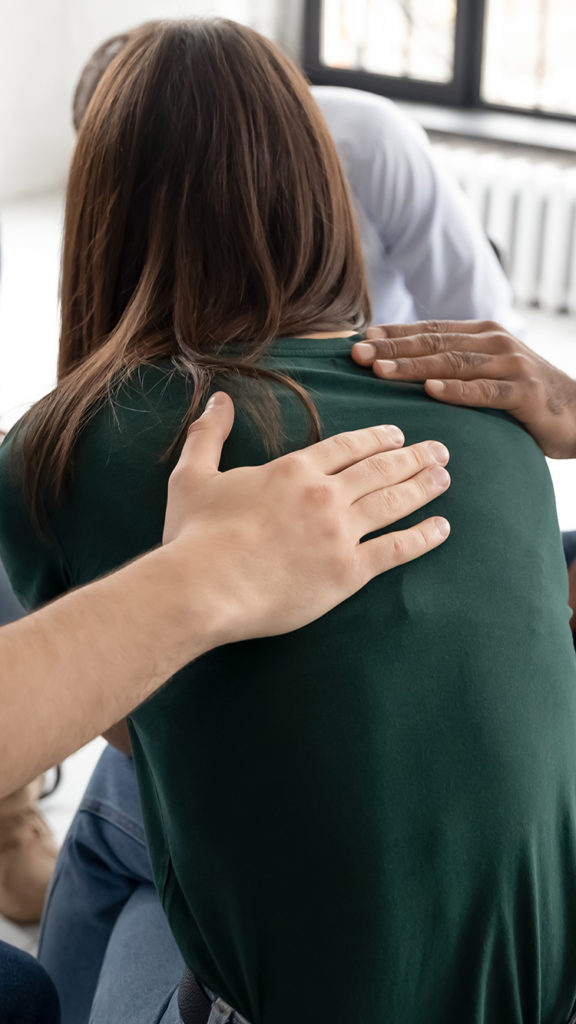Suicide is one of the leading causes of death in the United States. For people living with depression and bipolar, thoughts of suicide can be common, yet frightening. In this resource hub, you’ll find information to help manage thoughts of suicide, resources to create a crisis plan, and information on identifying signs and symptoms in others.
Suicide Prevention Awareness Month

Suicide Prevention Information
Understanding suicidal thinking and steps you can take to help yourself or someone you love is critical to suicide prevention.
Prepare for a Crisis
While we never want a crisis to occur, being prepared can make all the difference. Learn more about resources and plans you can create to help in a crisis.
Prepare for a Crisis Hotline Information
Suicide Prevention for Parents and Caregivers
One of the most challenging realities as a parent or caregiver is observing your child experience mental health symptoms. Of those symptoms, it can be the most challenging to process and protect against suicidality. In this article, we’ve outlined what parents and caregivers need to know for suicide prevention.
Supporting Survivors of Suicide Loss
Coping with the loss of a loved one is challenging, and it can be difficult to know how to best support someone who has lost a loved one to suicide. In this episode of the DBSA podcast series, two DBSA Young Adult Council Members interview co-facilitators of a Survivors of Suicide bereavement support group.
Discussion on Suicidal Thinking
Emma Benoit was paralyzed by a suicide attempt but used her painful experience to spread hope and awareness. DBSA hosted a panel of peers and subject matter experts who shared stories and resources to help teens, their parents, and loved ones better understand suicidal thinking and mood disorders.
Unpacking Mental Health with a Community
“When I started joining DBSA support groups, it was like they were taking the boxes from the shelves on my behalf. Someone would tell a story and one of my own boxes was labeled with exactly what they were talking about. It helped me start to unpack by just listening.”
Neville faced mental health challenges due to childhood bullying and domestic violence. After his sister’s death, he hit a crisis point and contemplated suicide. In search of help, he discovered the Depression and Bipolar Support Alliance (DBSA) and joined online support groups. Listening to others helped him unpack his emotions, regain confidence, and improve his relationship with his parents. He now emphasizes the value of community and encourages others to seek support without fear of judgment.

Find a Peer Support Group
Peer support has been proven to increase treatment responsiveness, hope, social function, wellness, and self-esteem and bring about a sense of control, all of which can help decrease suicidal thoughts. DBSA offers in-person and online support groups. In addition to our general support groups, we offer identity-focused groups, designed to be welcoming and supportive spaces, these groups offer participants the chance to discuss shared experiences and find community with others walking a similar path to wellness. Find a group today.
Chapters in Action
A Note from DBSA Louisville Chapter President
I’ve had a lot of conversations over the years about suicide with a lot of people. I’ve been inpatient three times myself for being this close to doing it. For the last year and a half, I’ve facilitated a weekly support group meeting at a hospital for inpatients. There is one thing everyone has agreed about:
None of us actually wanted to be dead. We wanted the pain to stop and we didn’t know how else to make that happen.
There are no minimum requirements to meet in order to become depressed or to develop suicidal ideation. There’s no such thing as being too “this” or too “that” to experience these things. As our chapter vice president once said, “You can’t deny anyone their pain. Whatever hurts, hurts.”
We don’t have to know how to make anyone else’s pain stop. It’s not ultimately for us to do anyway. What we *can* do is help each other feel validated. We can listen attentively to one another, without passing judgment. We can share our personal experiences to show other people that they are not alone. This is our entire model at DBSA, and it’s why our motto is what it is: “We’ve been there. We can help.”
Visit DBSA Louisville’s Website
DBSA Metro Atlanta
DBSA Metro Atlanta Chapter hosted a webinar that focused on suicide awareness and prevention and provided informative/educational discussions, shared experiences, public awareness and Q&A with their Guest Panelist Karli Cook-Dutta, MSW, CAS.
You Can Help
With your support, we can continue to offer our lifesaving services to our community to stop the rate of suicide from increasing to foster connection, wellness, and hope.


